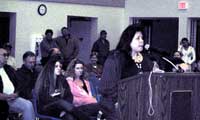Pomo Indians win, change mascot’s name
By
Terri Kay
Kelseyville, Calif.
Published Mar 27, 2008 12:35 AM
The Pomo Nation in Lake County, Calif., has overcome a racist campaign mounted
in the Kelseyville school district to overturn the righteous renaming of the
Kelseyville High School mascot from “the Indians” to “the
Knights.” At a Kelseyville H.S. school board meeting, attended by more
than 100 people on both sides of the issue, the board voted 4-1 not to return
to the Indian mascot name.
About 40 people spoke at this meeting, about two-thirds of them in support of
the Pomo Nation. At the previous board meeting, with 350 in attendance,
speakers were more evenly divided. Heavy discussion in online and print media
between the two meetings showed the support for the racist initiative
fading.
In response to a proposal by one of the racists for “a compromise,”
dropping the mascot caricature but keeping the Indian name, Lisa Mammina, from
Ukiah, added a touch of humor by saying she was confused about who were Indians
and who were not. Pointing to those seated on the left, many wearing
sweatshirts claiming “Always an Indian,” she said, “I think
it’s really cool they (pointing to the Pomo people on the right) are not
asking for their land back. All they’re asking for is their name
back.”
“Are we going to teach our kids, ‘We’re going to use your
name and we don’t give a darn whether you like it’? That’s
not right,” said a 1945 Kelseyville H.S. grad, Bob Prather.
“As a Native American, I am saying that it’s not OK, it’s not
for sale, and it’s definitely not to be used,” said Tera
Duncan.
The name change was originally won only a couple of years ago, at the
instigation of Clayton Duncan, a local Pomo. He brought letters from the five
local tribal councils to the previous school board. Duncan was able to win
enough support so that the mascot name was unanimously changed by the school
board from “the Indians” to “the Knights.” Since then
there has been a school board election campaign, with those supporting the
racist initiative running candidates to get the change overturned.
The Pomos are also mounting a campaign to change the name of the town of
Kelseyville, which is named after one of the settlers who was responsible for
the enslavement, starvation and murder of many Pomos. His name is a constant
reminder of the bloody history of slavery and massacres which were carried out
against the Pomo and other Native nations by the white settlers.
They are also trying to get support for the promotion and distribution of a
very moving documentary entitled “Hinthel Ganula.” This movie,
which was produced locally, documents the struggles for survival of the Pomo
people in northern California, focused in the region now called Lake
County.
Clayton Duncan’s great-grandmother was one of the lone survivors of a
particularly heinous event, “the Bloody Island Massacre.” During
this criminal atrocity she hid in the shallow waters of the lake, breathing
through the tulles. Still clutched by her dead mother, she watched the white
soldiers murder every man, woman and child on the island.
Articles copyright 1995-2012 Workers World.
Verbatim copying and distribution of this entire article is permitted in any medium without royalty provided this notice is preserved.
Workers World, 55 W. 17 St., NY, NY 10011
Email:
[email protected]
Subscribe
[email protected]
Support independent news
DONATE


